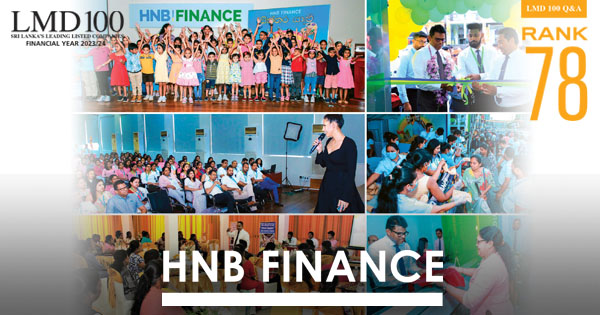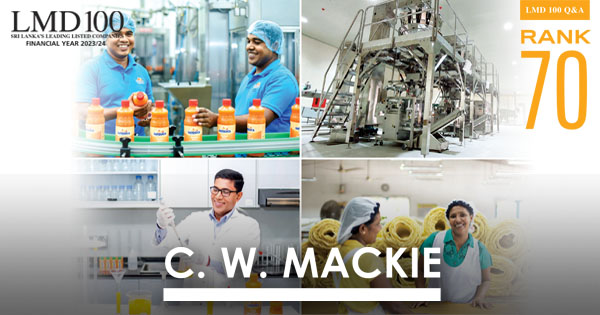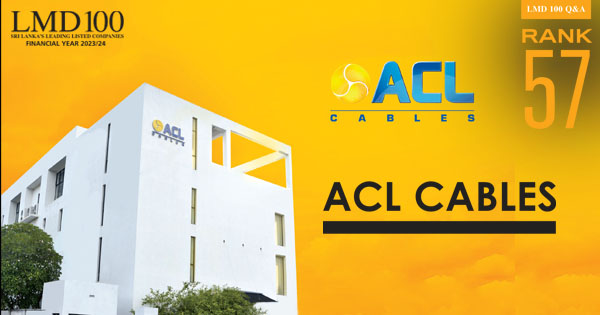TOKYO CEMENT COMPANY (LANKA)
LMD 100 Q&A
RANK 39
Aligning strategic government policies to prioritise local value creation is the way forward, to foster a favourable business environment and contribute to economic stability
Q: How would you assess your business performance over the past year – and what opportunities or expectations do you foresee for the year ahead?
A: In 2024, we experienced a period of greater stability, reflected in a steady increase in cement consumption, driven by the demand from hospitality, real estate and residential sectors.
This growth was underpinned by stable material costs contributing to a revival of private sector investments and consumer confidence. The impact of interest rates cuts also encouraged financing for construction.
Looking ahead, we anticipate this positive momentum to continue with commercial and domestic consumption expected to grow further. The resumption of government infrastructure projects and an influx of foreign funded investments, which typically involve longer development cycles, will also play a pivotal role in driving demand.
These developments position us strongly for sustained growth and an expanded role in supporting the nation’s economic recovery in the year ahead.

Director – Innovations
Q: As Sri Lanka embarks on a fresh chapter in the context of its politics and the economy, how ready and geared is the corporate sector to drive growth and overcome the consequences of past challenges?
A: Sri Lanka’s corporate sector, particularly the construction industry, remains optimistic about driving growth despite recent challenges such as inflation, supply chain disruptions and political instability. Businesses are leveraging investments in technology, sustainability and operational expansion to adapt.
However, consistent policies, fiscal stability and addressing skilled labour shortages are critical for unlocking growth potential. Aligning strategic government policies to prioritise local value creation is the way forward, to foster a favourable business environment and contribute to economic stability.
Q: How is your company faring against the backdrop of the prevailing macroeconomic milieu?
A: The rupee’s steady appreciation against the dollar over the past two quarters has eased inflation, reduced costs for goods and utilities, and stabilised construction material prices. Declining interest rates have spurred private sector investments, driving economic and construction sector growth.
Despite temporary disruptions from consecutive elections, the positive momentum is expected to continue, fuelled by new project opportunities and sustained market confidence.
Q: How can Sri Lanka improve its ease of doing business and competitiveness on the international stage?
A: Complex approval processes, inconsistent procurement practices and poor institutional coordination remain significant challenges – causing inefficiencies, and making investors and businesses vulnerable to exploitation. Digitalising approval systems can eliminate red tape, enhance transparency and attract more investment.
Additionally, frequent and abrupt changes to statutory guidelines – particularly in the construction industry – often overlook industry expertise and associated costs. Aligning these guidelines with global standards is important but it should be done systematically, and with consideration for local conditions and realities.
Q: What are the main challenges facing the construction industry?
A: Contractors face significant challenges with inconsistent contractual and payment terms in government projects, leading to disputes and cause cash flow disruptions down all supply chains.
Digitalising processes will enhance transparency and ensure formal, systematic contract execution. For example, digitalising title deeds is crucial for resolving land disputes – which dominate construction-related litigation and often take years to settle – saving both time and money while boosting efficiency.
Q: To what extent does your company harness technological advancements in its operations?
A: Tokyo Cement has optimised its customer value creation process by leveraging advanced technology across manufacturing and marketing. Through cutting-edge R&D, we have reduced reliance on imported raw materials; incorporating locally sourced, alternative cementitious materials to improve product performance and quality.
In line with our commitment to sustainability and net zero emissions, we have introduced low-carbon cements and carbon-cured concrete, successfully transitioning the market to adopt greener solutions.
Furthermore, our factory expansion project – set to conclude this year – will reaffirm our position as Sri Lanka’s largest cement manufacturer. This will boost our annual capacity to four million metric tonnes, improving production efficiency to meet the highest quality and sustainability standards.
REVENUE (RS. M)
49,824
REVENUE CHANGE
(12)%
PROFIT AFTER TAX (RS. M)
2,422
PROFIT CHANGE
(52)%
TOTAL ASSETS (RS. M)
50,633
SHAREHOLDERS’ FUNDS (RS. M)
27,518
MARKET CAP (RS. M)
15,140
EARNINGS PER SHARE (RS.)
5.48
PRICE EARNINGS RATIO
9.40
EMPLOYEES
1,201
Telephone: 2558100 | Email: sales@tokyocement.lk | Website: www.tokyocement.com






